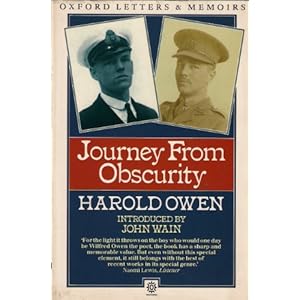
Watching the steely sky gentle into a hint of sun I am reading M R James's The Mezzotint and get into a Twitter conversation with writer Robert Hanks and the Rev Richard Coles about James and ghosts. At some point I mention two incidents from Harold Owen's three-volume memoirs of his family and his brother Wilfred, Journey from Obscurity. In one of them Harold meets Wilfred on the day of Wilfred's death, in the other, the one I was trying to remember, there is an incident in a wood, with the whole family involved.
At that point we reached Cambridge and on the platform I bumped into a university colleague and we talked all the way to Kings Cross, so the thread was lost. The rest of the day was very full and it is only now, having returned home, that I have found the incident. It is in Volume 1. Childhood, pp79-83 in my edition. It took about quarter of an hour to find it. Harold Owen is not a great writer of prose, slightly awkward, but had a wonderful eye and an extraordinary memory and sensitivity to place and mood.
I won't try to summarise in full here. THis is the Twitter log as addressed to Robert and Richard:
The Owens are in Ireland, father chooses unfamiliar way through dense woods. Something 'large & animal like moving ... along a branch. They all see it. Wilfred trembling. Suddenly heavy rain then stops. Mother 'desperate' to..get out of wood. They are surrounded by cloudburst vapour. They walk between trees down seemingly endless tunnel...and suddenly come to clearing with 'what appeared to be a sheet of water'. High wall of mist cuts across in...perfect straight line, some menacing sense of danger. Father says it's all nonsense & walks ahead, they follow...noticing mist & water receding at precisely the pace they're walking. All trembling now. Father moves...ahead, water & mist retreat before him. Mother turns & screams. 10 yards behind shadowy figure of a tall..man, radiating same 'cold incandescent quality' as the lake. All feel 'desperately insecure'. Father...addresses the man. Man contorts 'into a frenzy of fury' raising his stick. Father speaks again to same...effect, another paroxysm. Father angry walks towards man who retreats keeping precisely same distance as if...the pair were synchronized. When father retreats figure comes forward etc. Father advances fiercely. Figure disappears...Mother cries, 'Tom, Tom, come back'. Father stands motionless, returns depressed. Lake has disappeared...
That's it, but the story is told at a very good, compulsive pace, which is probably why I remembered it relatively clearly.

4 comments:
I came across The Mezzotint in a wonderful collection called Great British Short Stories, which my brother and I used to enjoy. I found that story to be insanely scary.
It is, Clarissa He is very good and very delicate, which makes it worse. Expectation is the trick, the innocuous that leads to a suspicion and on too the moment of terror
I was gripped by those memoirs: they anchored the famous poet in family, localness, hardship. Not least Harold's farm labouring in the 20s, post-war, post-Wilfred. Aged 19, 20, I wrote to Harold Owen. He had just died. His widow invited me to tea. She was living in a council house, one of Harold's paintings taking up, as I remember it, a whole wall. Stacks of his drawings, prints, engravings, were everywhere: she pulled them out from drawers, from under her bed. She wanted me to have one, insisted. Which is how I come to have an engraving by Harold of the bazaar in Calcutta.
How marvellous, Charles! I bought the three volume set from Peter Scupham who had recommended it. It was a marvellous unusual view of the Owen family, and Harold was such a sensitive observer. He is good on his time in the navy too. It's not great writing as writing (though it isn't bad at all, just a little stiff) but the vision and detail are superb. And how great to visit his widow and to be given an engraving. I haven't seen much of his art. How did it strike you?
Post a Comment